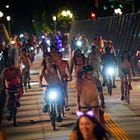Two naked bike rides will roll through Portland this summer
In a summer shaped by division and protest, Portland is doubling down on nude cycling
Two separate World Naked Bike Rides will take place in the city of Portland, Oregon this year, marking a symbolic split in what was once a unified movement. The original Portland ride, known as the Portland World Naked Bike Ride (PDXWNBR) and organized since 2004 with support from local nonprofit Umbrella, will roll out from Grant Park on Saturday, July 26. Just two weeks later, a breakaway group will host its own ride, the World Naked Bike Ride Portland, on Saturday, August 9, with plans to once again stage a protest at Zenith Energy in North Portland.
The July 26 event is staying the course: cyclists gather at 6:30 p.m., the ride departs at 8:30, and—as always—the route remains secret until wheels are in motion. Billed as a protest for body positivity, cyclist safety, and environmental awareness, this ride remains the larger of the two, regularly drawing up to 10,000 participants, and is part of Portland’s months-long Bike Summer festival.
The newer group, which first emerged in 2024 after the main ride was canceled, expects around 1,000 riders and is focused on direct-action protest. Organizers say they’ll “amplify calls for environmental justice by holding Zenith Energy and the City of Portland accountable for practices that harm both residents and the environment.” The offshoot ride also retains the “World Naked Bike Ride” name—giving an emphasis to continuity, even as it challenges the original.

The split traces back to spring 2024, when PDXWNBR leadership canceled that year’s ride citing a lack of volunteers and planning delays. A group of volunteers then organized an alternative ride in defiance of that decision, leading to internal friction over community norms, naming conventions, and organizing ethics. Planet Nude first reported on the schism in September 2024, when the original organizers of PDXWNBR expressed dismay over how the new ride was formed, despite supporting its environmental goals, telling Planet Nude at the time: “We support any naked ride that protests our dependency on oil, but we are disheartened by the nature of this particular ride.” They voiced concern that the new organizers had blocked them and others on social media, refused media engagement, and were already planning a 2025 ride before dialogue could take place. While the two groups reportedly exchanged messages about mutual support earlier this year, there has been no visible collaboration since.
The result is two events, two visions, and a city with one of the most deeply rooted nude cycling cultures in the world now navigating its own internal disunity.
Still, both rides are legal under Oregon law. While public nudity is technically prohibited, state courts have long upheld protections for political protest—making Portland a rare city where a fully nude demonstration of this scale can thrive.
A tense national backdrop
Portland’s unusual abundance of rides comes in contrast to the mood in other major cities, where tension and safety concerns have prompted cancellations and postponements.
In Los Angeles, organizers postponed their June ride to September 13 following ICE raids and ongoing unrest in the city’s downtown core. “The parking lot [for the meetup] is right across the street from the detention center,” said WNBR LA organizer Cynthia Holbach, citing safety as the driving concern.
In Boston, organizers of that city’s World Naked Bike Ride called off the 2025 event entirely, stating that their energy would be better spent on urgent social and political causes. “We hope to be back in 2026,” they wrote, while urging riders to redirect their activism toward more immediate community efforts.
Even amid these cancellations, interest in naked protest remains strong. But how that protest takes shape—and who gets to define its message—has become a central tension within the movement. In Portland, the situation offers both a cautionary tale and a potential model. While the rift reflects challenges many grassroots movements face, it also demonstrates the power of local action to keep traditions alive—even if the route gets a little more complicated. 🪐








Plan on moving to Oregon soon hopefully I arrive in time for one of these
Boston is having a similar split. The main group has been having volunteer issues for years but was extremely slow to respond for help requests and was mostly just interested in leaders for the route.
They cancelled the ride this year citing the current political climate and someone else has started a new group and is leading the charge.